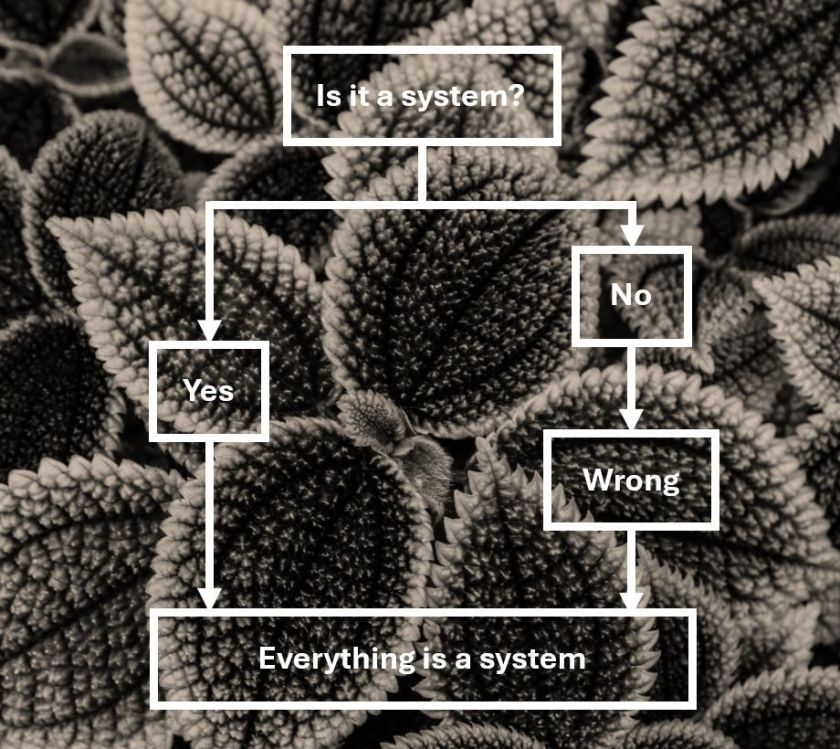Mentioned several times that, within the Systems Thinking community in its widest sense, there are factions that don’t just have preferred views, they positively reject others.
Even within those that see Systems as the main focus, there are competing theories, sciences and methodologies, as well as competing and complementary world-views on multiple dimensions. A large part of my own recent agenda has been to emphasise the recognition that our knowledge of systems and their practical implementations involves more than science – wisdom for short-hand convenience – whichever of the theories or sciences are preferred. The practical views are ultimately Pragmatism by any other name, and Mike Jackson’s comprehensive contribution also emphasises this (last section of a long diary post).
I say “even” because there are factions that reject the language of Systems entirely in favour of Complexity sciences and methods. Most systems thinkers see their thinking as a response to complexity, whatever definition of systems, or preferred theories and methods we espouse. No systems thinker would reject the significance of complexity to their discipline. Those who espouse complexity rather than systems have identifiable reasons. The two examples I’m going to use are Jean Boulton (The Tao of Complexity) and Dave Snowden (Cynefin) and their rejection of systems in favour of complexity might be all they have in common.
The first reason is quite straightforward. Naming things as systems – a system or the system – with specific identity and characteristics – objectifies & reifies them implying well-defined, possibly static, boundaries. The first of Boulton’s conditions (below) is exactly this. All systems in the cosmos are open systems except – by definition – for the cosmos itself. Naming, drawing a #GoodFence as a boundary around any given system of interest, is always a pragmatic linguistic convenience. Drawing a boundary needn’t imply that it is impervious to systemic activity.

A second reason is in the definition of what we mean by “system”. We can start with Boulton’s second and third conditions – diversity and reflexive relationships. Any system of interest has multiple different elements – requisite diversity – and that these are functionally related to each other and to other systems. The three conditions are met by just about any systems definition.
A corollary, and third reason arising from the second, is that anything and everything can be considered as a system in those terms.

Which is all encompassing of life, the universe and everything, so thinking of something as a system doesn’t narrow down our scope of interest. It’s almost redundant to refer to something as a system if everything is a system. Which is probably another reason why Snowden rejects the language.
But, in fact, System is practically just an adjective for thinking in terms of functional relations. Systemic Thinking if you prefer. And ISSS Past President, George Mobus also presents “A General Theory of Systemness, proposing that we look at the essential characteristics of being a system rather than debate endlessly what does or doesn’t count as a system.” [recent ISSS Newsletter] Precisely! The characteristics of systemness that make something systemic – rather than needing to agree the definition of a system – whether we call “it” this or that system or not. [To emphasise the dynamic, verb or adverb rather than noun or adjective Rasmussen suggests “Systeming” – what systems do.]
Pragmatically, the preference for complexity and/or systems language is a non-event. We all need complexity and dynamic functional systemness or systemicity.
=====
[Note: – the idea of #GoodFences and identity-defining-boundaries is a whole subject in itself here on Psybertron.]
=====
Post Note: Dave Snowden’s own writing continues, here via LinkedIn.
He’s OK with Systems as “Complex Systems” – which is about where I am, obviously. His use of the word “substrate” illustrates his (correct) architectural distinction that much of what matters at the human level primarily emerges from and supervenes on the physical as creative constraints, not in any way reductively causal. And in an earlier post he’s complaining about fashionable misuse of Pragmatism – between natural language pragmatism and the US Pragmatists – I’m already on it. And I notice a few converging threads. Another round of people thinking they are “debunking” Maslow (they’re really not), some conversely suggesting there’s a layer of “Transcendence” above Self-Actualisation and Dave railing against Transcendence. All good fun.
People confuse short-hand with precision – really just a language game #GoodFences (again).
=====
